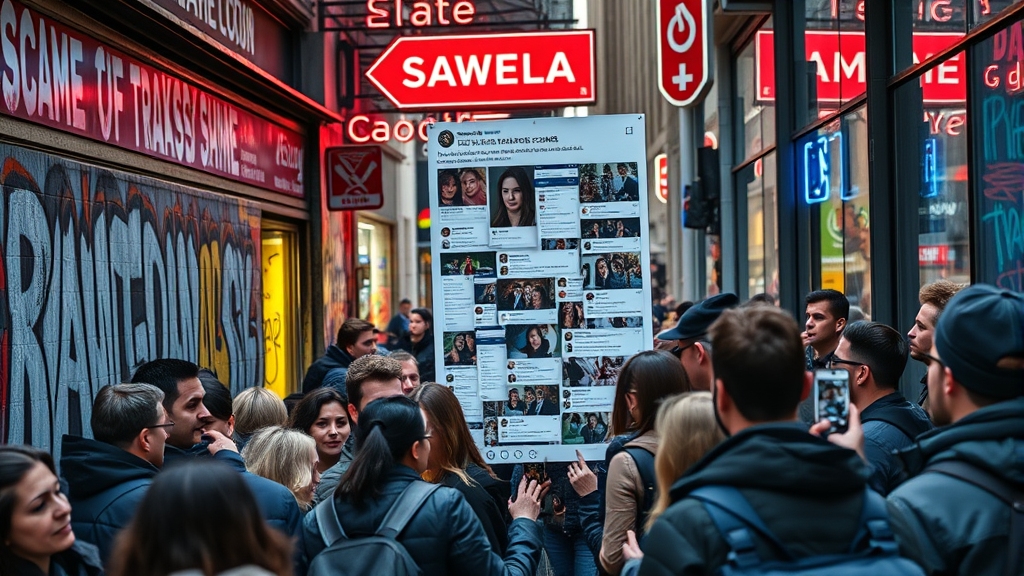When cheating scandals unfold on social media, you’re exposed to swift public shaming that can ruin reputations overnight. Your private mistakes become public spectacles, making it hard to regain trust or privacy. The digital footprint of such scandals can haunt you for years, impacting relationships and job prospects. The emotional toll often includes shame, anxiety, and feelings of helplessness. If you want to discover more about protecting yourself from the fallout, keep exploring how social media impacts privacy and mental health.
Key Takeaways
- Social media amplifies cheating scandals, turning private issues into public spectacles with rapid dissemination.
- Public shaming on social platforms can cause long-lasting reputational damage and emotional distress.
- Victims often experience shame, anxiety, and depression due to relentless online judgment and comments.
- Managing digital footprints and privacy is crucial to mitigate long-term negative impacts of exposure.
- Support tools and strategic reputation management can help individuals recover from social media scandals.

In today’s digital age, social media has become a powerful platform where public shaming can quickly escalate, often with severe consequences. When a cheating scandal unfolds online, you might find yourself caught in a whirlwind of judgment and scrutiny that feels impossible to escape. The speed and reach of social media mean that what starts as a private mistake can become a public spectacle overnight. This rapid spread raises significant privacy concerns because your personal life, once confined to a small circle, is suddenly exposed to thousands or even millions of strangers. Unlike traditional gossip or rumors, social media amplifies your mistake, often leaving little room for privacy or redemption.
Social media turns private mistakes into public spectacles, exposing your life to millions and amplifying the fallout.
The consequences of such exposure extend beyond the immediate embarrassment. Public shaming on social media can have a profound impact on your mental health. You might experience feelings of shame, anxiety, or depression as you grapple with the fallout of your actions. The constant barrage of comments, opinions, and judgments can be overwhelming, making it feel like your private life is no longer yours. The relentless nature of social media means that even after the initial scandal dies down, remnants of the shame can linger, affecting your self-esteem and mental well-being long-term. It’s easy to get caught up in the mob mentality, where the collective outrage amplifies your distress rather than offering understanding or forgiveness.
You might also notice that once your personal information is out there, it’s nearly impossible to fully control who sees it or how it’s shared. This loss of control over your privacy can leave you feeling vulnerable and exposed, intensifying the emotional toll. The digital footprint created by a cheating scandal can follow you for years, affecting your relationships, reputation, and even employment opportunities. The shame of public exposure doesn’t just hurt your feelings—it can lead to serious mental health issues that require professional support. Recognizing the importance of privacy protection is crucial in today’s interconnected world, as data breaches and online harassment are increasingly common issues. Knowing that your private life is now part of a public discourse can cause anxiety and feelings of helplessness, especially when you’re bombarded with negative comments or cyberbullying. Additionally, the use of eye patches in skincare routines demonstrates how small, targeted treatments can provide quick aesthetic improvements, but they are not a substitute for comprehensive skincare or addressing underlying issues.
Furthermore, understanding the dynamics of social media outrage can help you develop healthier strategies for coping with public scrutiny. In such situations, it’s crucial to recognize the importance of safeguarding your mental health and privacy. While social media can be a tool for connection, it can also turn into a battleground where your personal struggles are broadcast for everyone to see. Protecting your mental health means seeking help when needed, setting boundaries on social media, and understanding that everyone makes mistakes. Remember, your privacy should be a priority, and you don’t have to face the shame alone. There are resources and support systems available to help you recover from the emotional impact of public shaming. Being aware of AI-powered tools for reputation management can also aid in mitigating long-term damage and rebuilding trust.
Frequently Asked Questions
How Do Individuals Typically Respond to Public Shaming Campaigns?
When facing public shaming campaigns, you often respond by building digital resilience, staying calm, and avoiding impulsive reactions. You might seek peer support from trusted friends or online communities to process the situation. Some people choose to address the issue publicly, while others prefer to stay silent and focus on self-care. Your goal is to navigate the situation thoughtfully, maintaining your well-being and reputation amid the social media storm.
What Are the Legal Implications of Public Shaming for Privacy?
When you’re publicly shamed, you might face legal issues like defamation lawsuits if false statements damage your reputation. Public shaming can also lead to privacy infringement claims, especially if personal or sensitive information is shared without consent. You should be aware that, legally, individuals can hold others accountable for harmful comments or privacy violations, emphasizing the importance of respecting privacy laws and avoiding defamatory content online.
Can Public Shaming Lead to Long-Term Psychological Effects?
Public shaming can cause long-term trauma, leaving emotional scars that affect your mental health for years. You might experience anxiety, depression, or difficulty trusting others due to the intense judgment and humiliation. These emotional scars can linger, impacting your self-esteem and relationships long after the incident. It’s essential to recognize that public shaming isn’t just temporary; it can have profound, lasting effects on your emotional well-being.
How Do Social Media Platforms Regulate or Intervene in Shaming Incidents?
Like a vigilant gatekeeper, social media platforms rely on moderation to regulate shaming incidents. They monitor content, enforce community guidelines, and remove harmful posts or comments swiftly. You can report abusive content, and platforms often have algorithms to detect violations automatically. By actively intervening through content removal and moderation, they aim to curb harmful shaming, though effectiveness varies depending on the platform’s policies and user cooperation.
What Ethical Considerations Should Be Taken Into Account During Public Shaming?
When considering public shaming, you should prioritize privacy rights and ethical accountability. Think about whether sharing sensitive information respects individuals’ privacy and if your actions are fair or harmful. Avoid spreading unverified claims and consider the potential impact on mental health. By balancing transparency with compassion, you guarantee your behavior aligns with ethical standards, helping maintain trust and integrity in online interactions.
Conclusion
While it might seem harsh, public shaming on social media often forces accountability and sparks important conversations. Yes, it can feel overwhelming or unfair at times, but ignoring misconduct rarely leads to change. If you hesitate to speak out, remember that standing up can protect others and promote honesty. Ultimately, by engaging responsibly, you help create a community that values integrity—because silence isn’t an option when justice is at stake.









